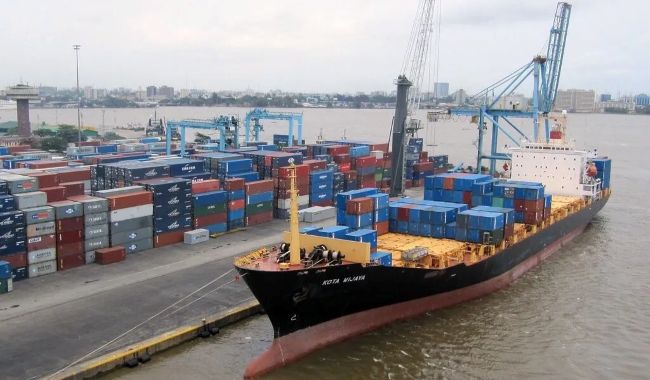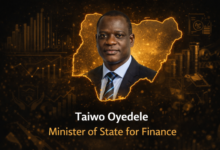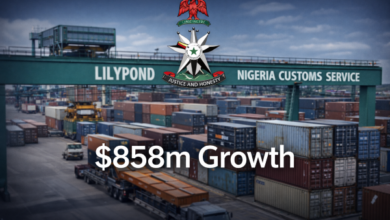FG to boost blue economy, integrate ports via road, rail, waterways

The Ministry of Marine and Blue Economy, Alhaji Adegboyega Oyetola, says the ministry is working on boosting the nation’s blue economy sector by moving toward integrating road, rail and inland waterways connectivity to the ports.
Adegboyega said this during the third Maritime Transportation Industry Breakfast on Wednesday in Lagos.
The theme of the event is, “Prospects for Accelerated Growth and other Matters Arising”.
Oyetola, represented by Director, Maritime Services of theministry, said that the integration would enhance the efficiency and competitiveness of marine transport.
According to him, another initiative undertaken by the ministry to accelerate the growth of the sector is the development of the Port Community System, an electronic platform to centralise and automate processes for stakeholders in the sector.
He said that the electronic platform would reduce processing time, ensure seamless coordination among stakeholders and enhance ease of doing business at our nation’s ports.
Oyetola said that the ministry was also implementing the Turtle Excluder Devices (TEDs) certification exercise to align with global conservation efforts and regulations.
He said that this would allow fishers to demonstrate their commitment to sustainability.
He also said that the initiative would open doors to new markets that prioritise eco-friendly products and ensure better prices and demand for their catch.
“The ministry has made moves toward strengthening the regulatory frameworks, enhancing the capacity of local fishers and encouraging private sector participation in modern aquaculture techniques to ensure the long-term viability of the industry.
”It is engaging relevant stakeholders to finalise the arrangement for the disbursement of the Cabotage Vessel Financing Fund (CVFF) to partners to improve the capacity of indigenous shipping firms.
“It also involves Constitution of a National Fleet Implementation Committee to establish a private-sector led Nigerian maritime fleet to participate in the carriage of the country’s import and export cargoes; among others,” he said.
He added that the maritime sector had been the mainstay of global trade and economic development for centuries as it accounts for over 80 per cent of global trade volume with vast oceanic potentials estimated to be worth over $1.5 trillion annually.
Adegboyega explained that the ministry and the Nigerian Ports Authority (NPA) had begun a port modernisation programme with Apapa and Tincan Island ports as pilot projects to ensure the reconstruction of existing and dilapidated port infrastructure for improved vessel and cargo turnaround time.
He acknowledged that the sector still faced challenges, including infrastructure deficits, security concerns and environmental issues.
”Addressing these challenges requires a multifaceted approach to position Nigeria as a leading maritime hub in Africa,” he said.
He attested to the fact that the Nigerian maritime sector offers vast opportunities and called for collective responsibility to harness its potential.
Speaking, the President of the Nigerian Maritime Law Association, Mrs Funke Agbor, said the association remained committed to supporting the legal, institutional and policy frameworks that underpin a thriving maritime industry.
Agbor said that the association would continue supporting the industry through advocacy, capacity building, and stakeholder engagement.
“We will continue to contribute to the sustainable development of our maritime and blue economy sector,” she said.
She said that maritime transportation sat at the heart of global trade and economic integration with an expansive coastline, strategic geographic location in Nigeria and growing interest in the blue economy.
Agbor added that there was untapped potential for growth, adding that realising the potential requires deliberate policy frameworks, effective regulatory oversight, private sector participation and continuous stakeholder engagement.
“The breakfast series was conceived by the Association as a platform to foster meaningful dialogue and collaboration among stakeholders within the maritime and blue economy sectors.
”In the spirit of partnership and progress, we gather today to exchange ideas, challenge assumptions and chart pragmatic pathways toward enhancing Nigeria’s maritime transport potential, an essential pillar of our national development.
“We appreciate the Minister of Marine and Blue Economy, Alhaji Adegboyega Oyetola, for sending a competent director to enlighten stakeholders on the progress of the present administration in the industry at the 3rd Nigerian Maritime Industry Breakfast, hosted by the Nigerian Maritime Law Association,” Agbor said.
She called for the encouragement of multi-sectoral conversation through the association to make Nigeria a preferred destination for cargoes within the African continent.










